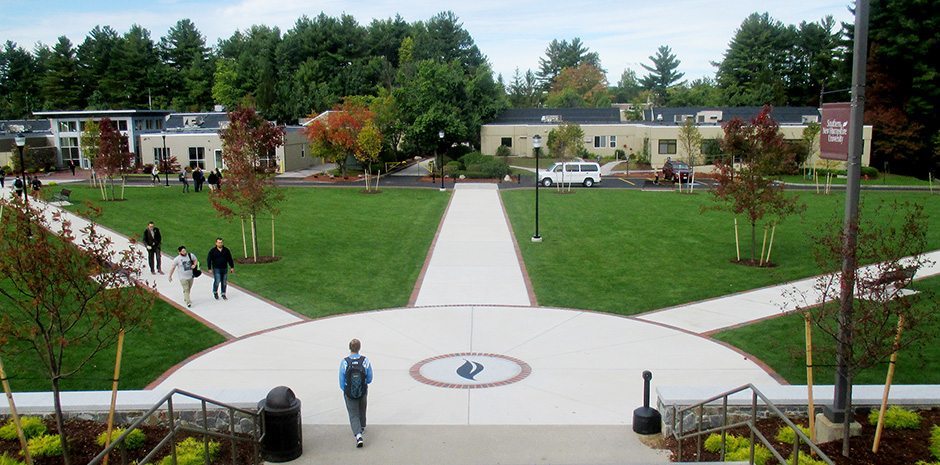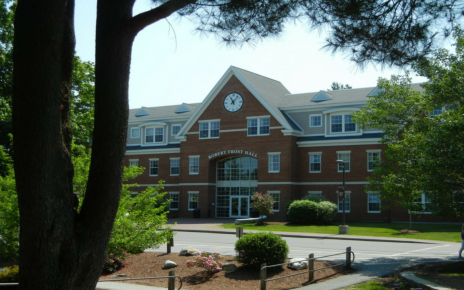Accessibility is a buzzword in higher education right now. It dominates most of the conversations at SNHU, whether it’s in the classroom or at an event. It comes from faculty, staff and administration alike. It’s the goal for SNHU.
Money has lead to the development of a five-year diversity, equity and inclusion (DEI) plan. It has also meant considering what the learning environment of the class of 2030 is. Most notably to the campus life though, accessibility is now making all SNHU departments refocus and “hyper-fixate” on financial health and sustainability according to University College President Patricia Lynott.
Towards the end of the spring 2019 semester, rumors of budget cuts started floating around. Since coming back to campus, students have started to see changes rumored to be the result of the cuts, including outsourcing of the study abroad department to Education First (EF), and a lack of trash bins in the residence halls.
SNHU denies any formal budget cuts and instead has decided to find ways to be more purposeful and efficient with spending.
It’s no secret that the College of Online and Continuing Education (COCE) has helped the University College (UC) flourish, particularly with capital projects, like new buildings. Dr. Lynott confirmed it was during the Great Recession in 2007 when President Paul LeBlanc pitched and convinced the board of trustees that investing in the fledgling online education division would help the campus survive by using the extra funds to offset campus costs. However, the success of the online division has transformed its original purpose.
“Something really incredible has happened, and we have learned that online division has become a model for what accessible nontraditional learning can be. We have become this multiversity of learning,” Lynott said.
Inevitably, the operating costs per student on campus are more expensive than the costs of a student online.
In October 2018, SNHU hired Chief Financial Officer, Ken Lee. Lee assessed and analyzed finances on a unit-by-unit basis. In December of 2018, Lee and his team were ready to share their observations.
While it was always known that the online division supported the campus financially, Lee’s team pinpointed exactly how wide the gap has become. It was during this time that Dr. Lynott learned that the amount for the campus to reach self-sustainability is “just under $25 million.” When asked for an exact number, Lee said, “I am very cautious about putting a specific number on it, because to be sustainable we don’t need to be positive.”
However, both Lee and Lynott shared that the institution as a whole is doing well financially. Lee shared that for the 2018 fiscal year the university had over $819 million in assets, a huge increase from 10 years ago when that number was $137 million. SNHU’s cash and short-term investments were $290 million, while its long-term investments were at $136 million and property and plant equipment were $322 million.
On the other side, SNHU’s liabilities were at $200 million. Lee explained this was due to debt taken for some of the new buildings. He also confirmed that the university has generated surpluses over the years too.
Lee emphasized the importance of analyzing this data now, while SNHU still holds a competitive advantage in the online education market. “The nice thing is we’re being proactive about it. Our backs aren’t against the wall. We aren’t trying to figure out how to save the university. We’re not in that situation.”
It’s always been a given that the online division would supplement the campus budget, but it’s also important to consider that for the past five years, SNHU has not increased tuition. Lynott shared that this isn’t just to make the traditional college experience more accessible. “We knew of course that we needed money at the end of each year from the online division. Which is great, no problem, because we believe in this campus. This campus is the center. Everyone supports the campus, including the board,” she said.
Instead of making a budget cut, the campus leadership has instead asked departments to “Hold steady. Take a breather,” according to Lynott. This has entailed a hiring freeze with Lynott asking departments to “be thoughtful” and “re-assess” when an opening is available. She’s also required departments to provide evidence on benefits when pitching new ideas.
While there have been changes on campus this year, these haven’t all been rooted in budgetary concerns. Lynott confirmed that talks of a partnership with EF and “outsourcing” the study abroad department began about a year and a half ago.
“[Partnering with EF] is not a question of cost savings. Will it save money? Yes, absolutely. But it will save students more money and give them more opportunities to study overseas. . . And that to us, that was just doing a better job,” she said.
Meanwhile, Dean of Students Dr. Heather Lorenz confirmed that facilities have not decreased their staff at all. Instead, the lack of trash rooms is a move to be more sustainable. She also addressed student concerns on a more limited number of university paid job options on campus saying, “There’s been no conversation among my team to decrease student staff. I think sometimes people feel it because there are fewer college-paid jobs, but I would argue there is a significant push for student employment.” Lorenz’s focus is on being flexible to pivot with student need.
If students have any other concerns about any potential budgetary issues, Lorenz asks students to keep giving feedback, ask questions, and come talk to people, herself included.




